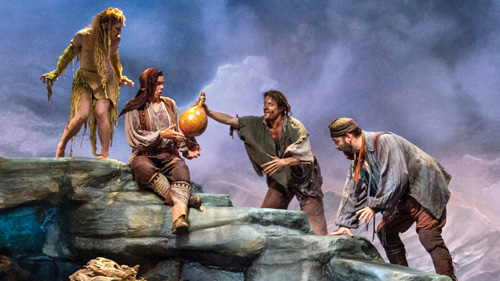A Straw Bale Home
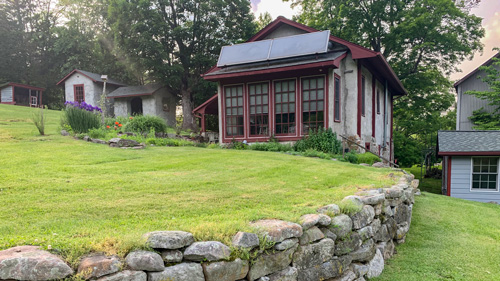
The straw bale house at Genesis Farm in Frelinghuysen demonstrates the use of locally available, time-tested renewable materials to construct an energy efficient, aesthetically pleasing home. This prototype was fully permitted and approved for residential use in 2001, connected to a solar array for its electricity needs, a solar-space heating system, a composting toilet and a grey water system.
All The News
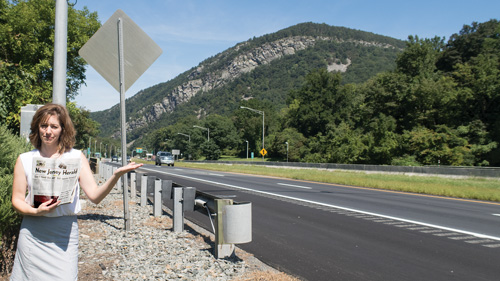
The morning thunk of a rolled and bagged newspaper on the sidewalk is a vanishing sound. Nevertheless, the public's need for local news has not abated. And many people understand that.
Centenary Stage Company
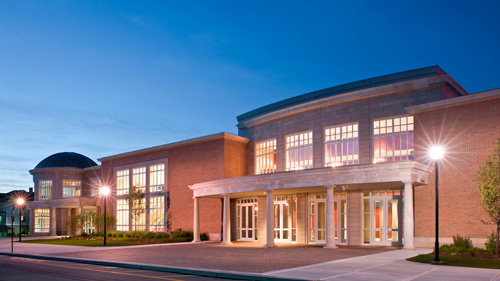
Charged with filling the new Lackland Center with a vital array of events, the Centenary Stage Company now provides a program of non-stop performing arts events for patrons from all over New Jersey, as well as Pennsylvania, New York and Connecticut.
Colleges and Universities

An invitation to the examined life, the altered course, the awakened mind, and perhaps, even, the inspired heart.
Dodge and Duke Estates

If a little money can be made to go a long way, surely a lot of money can be made to go a long, long way.
Farmstead Arts Center
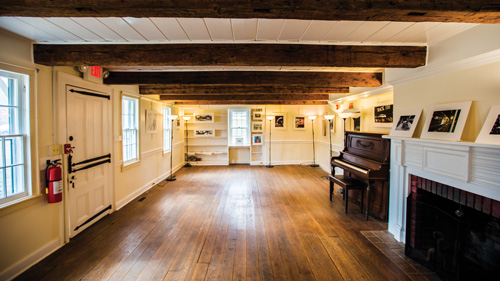
Farmstead Arts, in Basking Ridge, is a vibrant arts center and serves as a model for adaptive reuse of an historic treasure.
Haven at St. Hubert's for Unhappy Dogdom

Of all the things that Geraldine Rockefeller Dodge left behind -- €”the thirty-five room mansion, hundreds of acres of prime real estate, a Fifth Avenue townhouse, enough sterling silver trophies and bronze sculptures to sink a small ship, museum quality paintings, and a forty-four carat sapphire -- St. Hubert's Giralda may have been the one she valued most.
Hunterdon Art Museum

In 1952 a group composed of artists and community leaders acquired the stone gristmill for use as a nonprofit cultural center.
Impressions at Peters Valley School of Craft
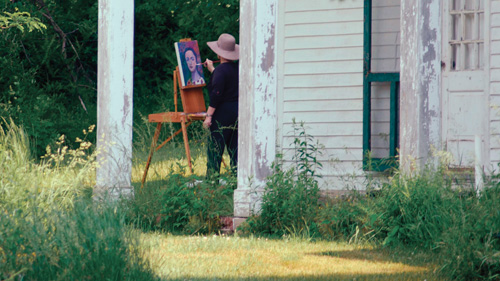
Plan your summer eduvacation with a class at Peters Valley.
NJ School of Conservation

The New Jersey School of Conservation is the Environmental Education Field Campus of Montclair State University. Located 57 miles from the Essex County campus, on a 240-acre tract within the boundaries of Stokes State Forest in Sussex County, it is the oldest university-operated environmental education center in the nation.
Star Bright

The UACNJ facilities in Jenny Jump State Forest, near Hope in Warren County, are 1,100 feet above sea level, one of the few dark sky locations left in the state.
The Seeing Eye: Puppy Love

For the formative steps in a guide dog's youth, The Seeing Eye relies on a network of Puppy Raisers throughout New Jersey and eastern Pennsylvania who participate in a program that began in 1942 as a joint effort with 4-H Youth Development.
Tibetan Buddhist Learning Center
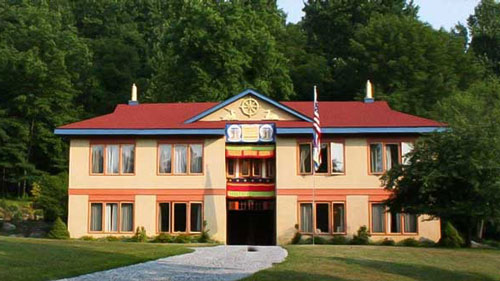
A long gravel path leads the way to the Tibetan Buddhist learning center in rural Washington Township.
Art Galleries

The artist's outlet is an art gallery or a store, and like the art within its walls a gallery can come in a variety of composition a for-profit commercial venture either privately or corporate-owned, a "co-op" group of artists who get together to sell their own work, or a non-profit as part of an educational organization or simply Here we take a look at how a few galleries in the Skylands sell art.
Artist Joan Tanner

Many of Joan's still life oil paintings are influenced by the colors and eccentric nature of Bucks County. She particularly tries to choose items and arrangements that convey the beauty in everyday life—the pop of green from a bowl of baking apples being readied for a pie or the sparkle of light on a grapefruit section at breakfast. Her family enjoyed collecting antiques, which often end up beside pears and berries from local farms in her paintings.
Dan Campanelli
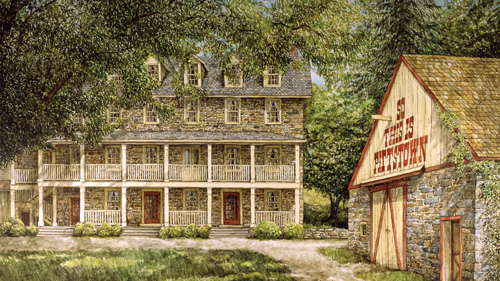
Seldom are artists able to remain so completely loyal to their original vision while achieving popular success.
David Rush Paints Waterloo Village

Artist David Rush paint images of Waterloo Village in Northwest New Jersey.
Delaware River School of Art
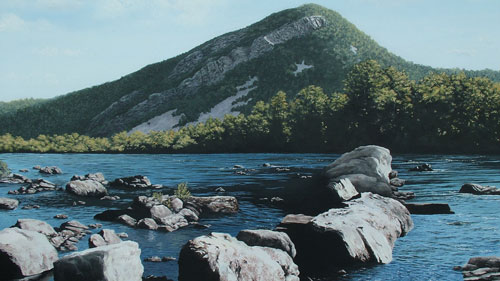
The land along the Delaware River is rife with artists who portray the river and its environment in all its splendor. Here are just four outdoors enthusiasts and artists who honor this federally-designated “Scenic and Recreational River†and surrounding landscape as the Delaware Water Gap National Recreation Area (DEWA) celebrates the National Park Service Centennial in 2016.
Delaware Valley Artist, Fred Kirberger
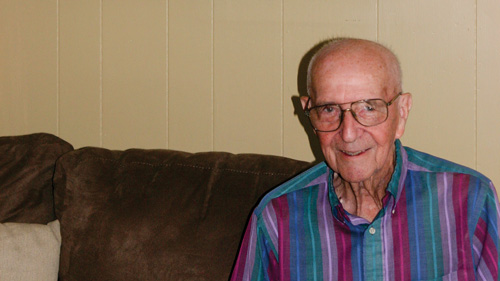
In 1952, when most of us that were here were still dabbling in crayons, Fred Kirberger was already at work as an illustrator with Charles E. Cooper Studio in New York City. Although he has painted scenes from Maine to Seattle, Kirberger was always drawn to the Delaware Water Gap since his days “as a kid†when he went to Shawnee to hear Fred Waring’s orchestra.
Delaware Valley Artist, Ken Metcalf
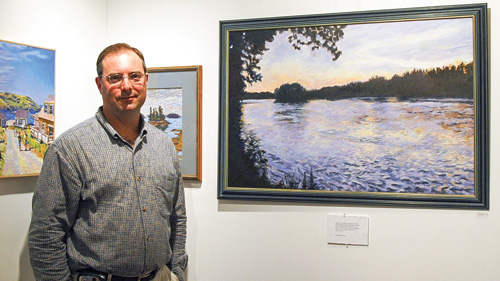
The free-flowing, undammed Delaware River has inspired Columbia resident Ken Metcalf, for twenty years with its beauty and the way light plays off the water. “The river is awesome,†he says. “How peaceful it is. And the way light reflects causes me to be reflective and meditative.â€
Delaware Valley Artist, Marie Liu
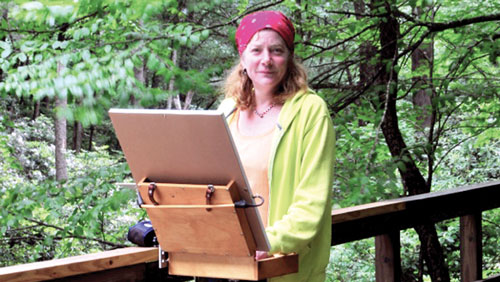
"I am intrigued by the history of where I live, and I like to reveal it back to people in my painting," says Marie Liu, first Artist in Residence of DEWA from summer 2015 to 2016. Liu was a landscape painter in Orange County, New York, frustrated because beautiful places were usually private property. Now in Milford, her dreams have come true with the freedom to hike and explore a wealth of state and federal land, perfectly open to the public.
Delaware Valley Artist, William Hobbs

William D. Hobbs, biologist, teacher and oil painter, builds his style upon the Hudson River School artists’ reverence for the natural world. He is inspired by late 19th century art and writings of Thoreau and the scientific aspect that everything in nature is worth studying. “With my training as a biologist, painting is another form of exploration. Science and art are one,†he says. The combination reveals itself in his work, where the viewer can almost feel the sunlight and moving water that is the focus of most of his paintings. More...
For the Birds
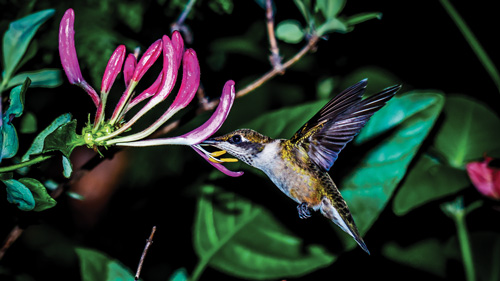
Who has not been enchanted by the mysterious hummingbird? You can turn your backyard into a hummingbird paradise, a place where these beautiful creatures will become regular visitors. Don't let them pass you by!
Harmony Ridge
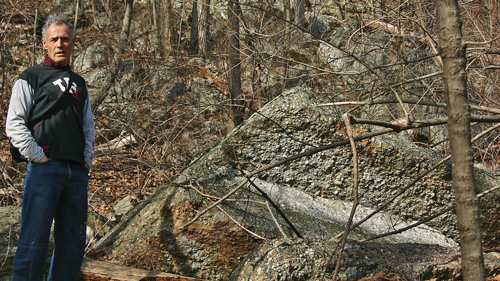
Robert Lobe adapts the ancient technique of repoussé to to reinvent nature from the Kittatinny ridge.
Itsuko Ishiguro, Potter

A petite woman stands behind the counter at Gallery 23, in Blairstown, so I walk over to a triangular display of pottery and cupcakes on the top shelf. Chocolate swirl, maple… they are clay, stoneware and porcelain, the art of Itsuko Ishiguro.
John Crouse; I Paint What I Know
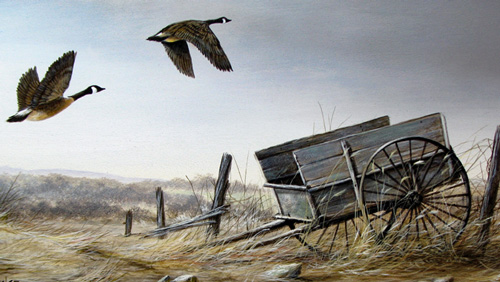
The rural scenes painted by Hunterdon County artist John Crouse are gaining notice.
John Mullane

John’s subjects include a wide variety of wildlife, landscapes, and people in Northwest New Jersey and the eastern United States.
Manfred Scheel Wildlife Carvings

Manfred Scheel's wood carvings are likely inspiration for any artist's quest for excellence.
Natural Gifts
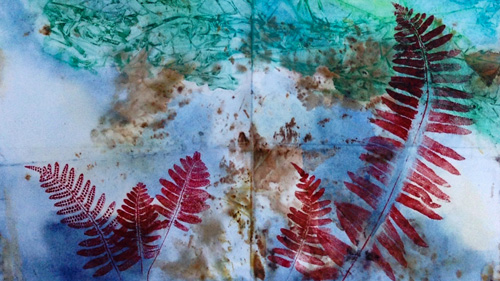
Here are artists who inspire their own inherent talents with other gifts from nature: a modern-day fossil maker, a wood carver with a global view, a painter of nature and emotion, and a horticultural sculptor of living art.
Natural Gifts: Bob Gherardi
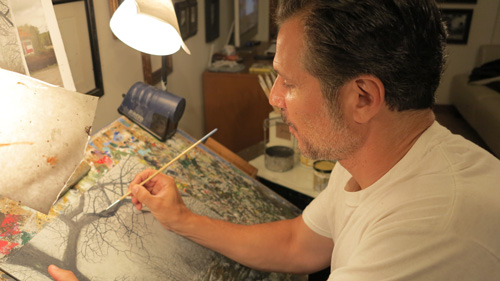
Bob Gherardi paints from the heart -- abandoned houses and places of yesteryear and even landscapes that he once knew or that evoke emotion and memories. Every painting has a story. It reminds him of something?an emotion or place he has been in his own heart that he identifies with.
Natural Gifts: Freehand Custom Carving
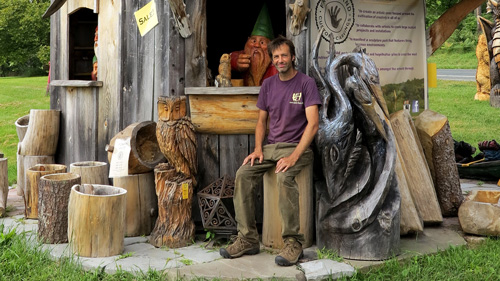
Brett McLain has created a living art gallery where wood carvers from across the U.S. and Europe come to enjoy the camaraderie, inspiration and carving experience of like-minded artists.
Natural Gifts: Lisa Madson and the Magic Cauldron
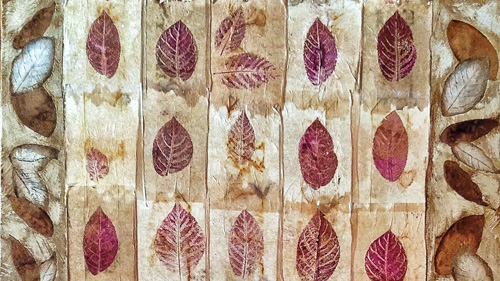
Lisa Madson, artist and art teacher, fires up the grill in her studio?her backyard patio?to create her art. Madson transfers the colorful impressions of flowers, leaves, grass and bark and other bits of nature onto heavy-duty watercolor paper; much as nature, over time, leaves images of animals and plants on rock.
Natural Gifts: Plant Sculpting
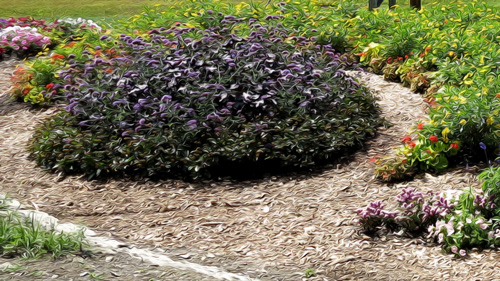
Richard Kaweske created Fair Acres Farm in Wantage twenty years ago, though he began creating flower beds when he was just a boy. ?I always created my nursery beds using my art degree from California College of Arts in Oakland.?
Ode to Jean

Kim Pollard's photographs recall the wreckage left by the Tocks Island project, as well as Jean Zipser's efforts to preserve the heritage of the Delaware River Valley.
Ricky Boscarino at Luna Park

Thirty-five years ago Ricky Boscarino bought a hunting cabin in the Sandyston woods and has been modifying it with a passion ever since. It is Luna Parc, an environment created by Ricky, artist, jeweler, builder.
Ursula Hamann, Paper-cut artist, Poet

When Ursula Hamann came to the United States from Germany with her husband John in 1954 she took the painterly scene by storm. Her oils, watercolors and pastels won accolades and rewards and a place in the American Artists Professional League. When illness struck 30 years later and the demands of painting stilled her hand, she returned to her roots, her childhood art of paper-cutting.
Vernal Equinox
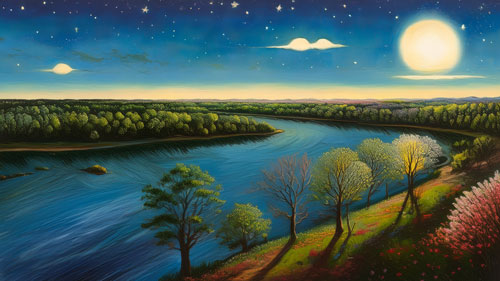
In a hemlock forest surrounding a little stream, snow remains packed, although receding, the stream's current running high and cold, coltsfoot spreading over an exposed shoal, a touch of yellow to brighten the otherwise bland landscape.
Wayne Card, Outside Artist

Walking through Wayne Card’s property is a privileged experience—like a ride in a spaceship to Planet Card. Fun, adventurous, and definitely unique, the man delights in making art, whether structural, commemorative or functional, sometimes unknown even to him, but always flamboyant.
Winter Photography
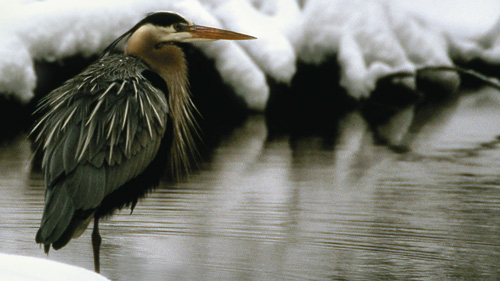
With a shift in perspective, photographers can fall in love with our short, cold days of winter
Bobby Caldwell: In the Pocket

Bobby Caldwell loved Warren County so much he moved here from San Diego, California in 2004 Bobby Caldwell loved Warren County so much he moved here from San Diego in 2004 when he married his wife Mary.
Heir Guitar

Mike Esposito remembers Joseph Kekuku, inventor of the steel guitar, who was buried in Dover.
Masterworks Chorus

Its been fifty short years since the original 28 members of Morristown's Masterwork Chorus began bringing praiseworthy performances of classic choral works to audiences in New Jersey and the New York metropolitan area.
Phil Woods: Straight Ahead
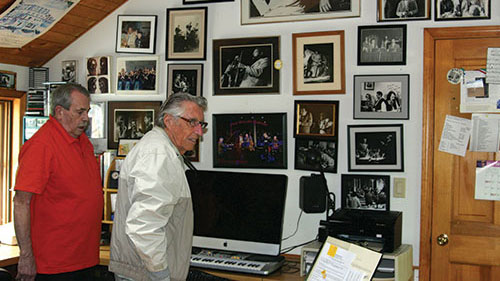
In the last ten years, Ed Coyne has produced seventy-five concerts in Northwest New Jersey, employing more than 250 jazz musicians; greats such as David "Fathead" Newman, Houston Person, The Four Freshmen, All Star Jazz Sessions, The Artie Shaw Orchestra, and Maurice Hines. But none greater than Phil Woods, one of the finest alto saxophone players of all time, who lives in Delaware Water Gap, PA.
The Folk Project

With activities and events throughout northern New Jersey, the Folk Project has developed over forty years as an all-volunteer, not-for-profit music-centered organization.
Welcome to Kinney Land
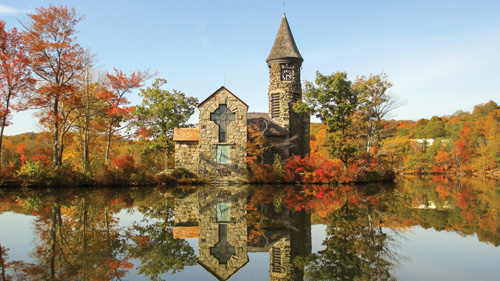
It began with a tobacco fortune and country retreat carved out of New Jersey hills and farmland. From high elevations -- socially, financially and geologically speaking -- the Kinney family, founders of the Kinney Tobacco Company, could look back toward New York City, where the money was made.
Acting Out
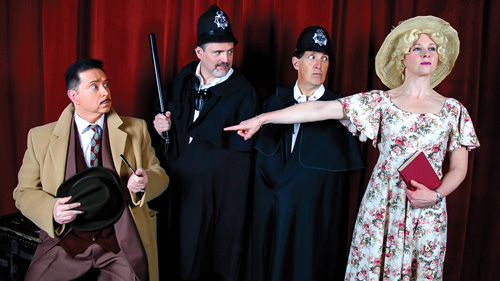
If all Morris County's community stages stood in one spot, they'd amount to one amazing theater mecca. Convenient? Sure. But having them all in one place would take the fun out of it.
Centenary Stage Company

Charged with filling the new Lackland Center with a vital array of events, the Centenary Stage Company now provides a program of non-stop performing arts events for patrons from all over New Jersey, as well as Pennsylvania, New York and Connecticut.
Centenary Stage Company: Well Seasoned
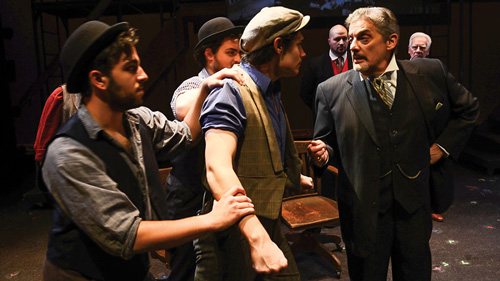
Centenary Stage Company is fountain of entertainment, but more an investment in artistic expression and cultural vitality. There is a prodigious model here, and when Centenary Stage does its job, seeds are planted in the community.
Tri State Actors Theatre

A first-rate group of professional Equity actors, their organization named the Tri-State Actors Theater, resides in Sussex Borough. Their Artistic Director is Paul Meacham.
Working Theaters

Production companies and presentation houses require different, but equally challenging skills, to survive. Getting people off the couch and away from their flat screens is no easy task. Here is how local professional theaters manage to satisfy a widely diverse audience, sometimes with as much drama off as on the stage.
Blacksmiths
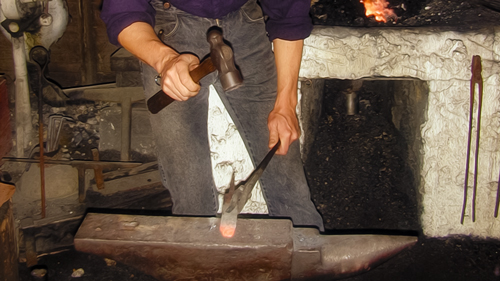
So, think you know the difference between a blacksmith and a welder? Although hobbyist blacksmiths have increased in numbers over recent years, not many people know the answer.
Cabinet Makers

In this fast-paced world of convenience and disposable goods, few things are meant to last, sometimes even the fabric of daily life. "House Beautiful" may be surface only, the trend for do-it-yourself lending itself to quick and easy fixes kitchen cabinets included.
Country Veterinarians

Many veterinarians live and work in northwest Jersey's farm country, but few are solo practitioners working from home without the assistance of other vets or technicians, venturing where they must to serve their paying and non-paying clients and patients.
Guitar Makers

In the great hills and valleys of Northwest Jersey, where dreams are big and the trees are tall, men with a love for music and wood tend to their craft with passion
Historic Barns
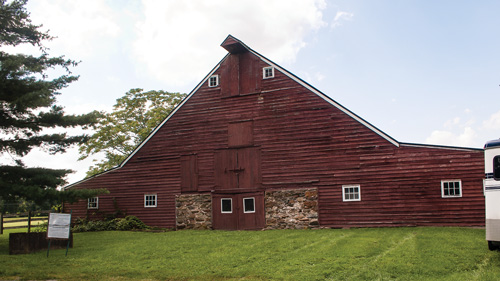
One thing that most people are not aware of, not even native New Jerseyans, is that the west central part of the state has the greatest diversity of barn types perhaps in the entire North American continent. A mixture of German, Holland Dutch and English customs, and a pronounced blending of Old World craft traditions, produced a multitude of various barn constructions. More than 150 years ago, they went truly ballistic with all kinds of barn building expressions.
Hot Rod Arts

The fever of buying, restoring, modifying, collecting and driving "hot rods" and "classic cars" is spreading. More than ever, people appreciate the way cars used to be built for performance, appearance and luxury, and they're investing in them for fun and profit.
Impressions at Peters Valley School of Craft

Plan your summer eduvacation with a class at Peters Valley.
Mark Simon's Terraplane Resonator Guitars
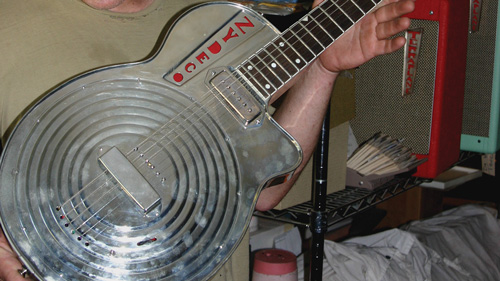
It's not hard to find a factory stamped, mass-produced resonator guitar. Were you in the market, however, for one of these amazing music machines, custom-made and tailored exactly to your tastes, you're best bet might be in Bridgewater, NJ, where Mark Simon makes both his home and the astonishing Terraplane resonator guitar.
Marks of a Champion
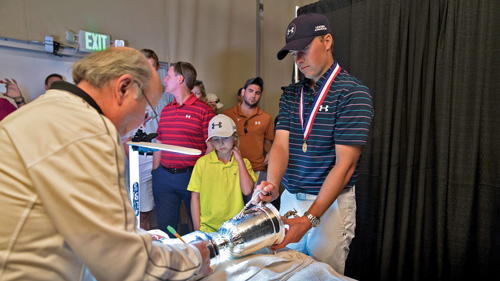
Realizing that he was an important part of their history, the USGA invited Doug Richardson to the 2015 U. S. Open to engrave the trophy for the winner, live and in person, in front of the TV cameras. For the first time, Jordan Spieth observed his name being engraved into the trophy in the way Paul Revere would have done it.
A Nod To Vince
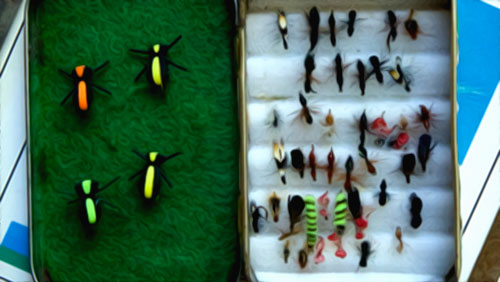
Around a slight bend in the stream, the current fell over a jumble of roots, flattening out for a few feet into a run a bit deeper than the riffles below it. Like a Haiku written by Basho that moment when a nine-inch rainbow rose to take the fly will remain with me for some time.
An Angler's Spring
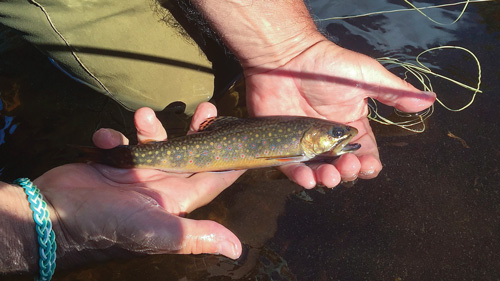
I do not require a calendar to announce the arrival of spring. For me, the first day of spring is that afternoon when I once again find myself along the bank of Bonnie Brook, my little cane rod grasped in my hand.
Bends in the River
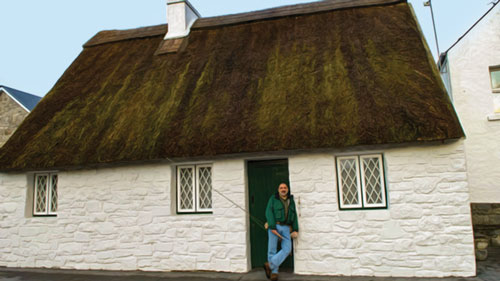
A number of years back, my wife and I spent two weeks along the western coast of Ireland. The plan had been to tour the countryside. In County Mayo, we stepped outside into a fine mist that had descended upon the village of Cong. It was what the Irish call a soft day. On that day, a number of years back, the wind had picked up by the time I turned down a lane at a wooden sign with the words QUIET MAN BRIDGE painted on it.
Double Header
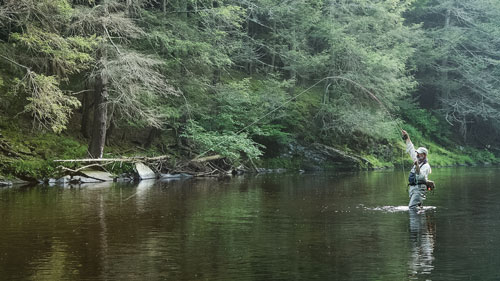
For the third time in as many minutes the trout rose under the shadow cast by the low-hanging branches of a maple tree. The subtle disturbance could easily be mistaken for a minnow or pumpkinseed, maybe a nymph breaking the surface to emerge into an adult mayfly.
Early Spring Fly Fishing
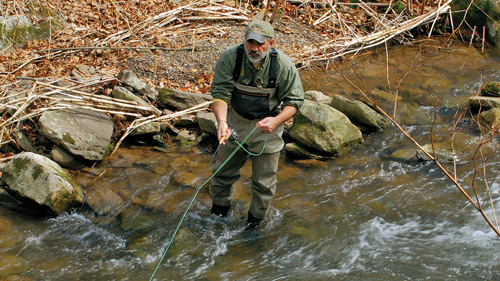
It's the puzzle that draws me back to the stream as much as anything else. The trout are there. I can see their rise forms, concentric circles expanding outward from where a fish has taken a bug, but are they feeding on mayflies, caddis or stoneflies, or maybe it's flying ants, perhaps beetles in season?
Fathers and Sons

In the photograph, my father looks through eyeglasses while working on his line, a fiberglass spinning-rod cradled in his lap.
First Snow

It started, as most things do, innocently enough, with a single flake fluttering shyly toward the lawn that was hidden under the fallen leaves. A moment later another followed and then another.
Fishing From A Belly Boat

I walk from the shore down the wooden planks to the dock, lugging my old belly boat over one shoulder, carrying fins in one hand and a nine-foot graphite fly rod in the other. In my chest pocket is a small box that contains a few Woolly Buggers and other large streamers tied especially for the big bass of this pond
Fishing With Faeries

Explore the charm of a place removed entirely from the ordinary aspects of everyday life; the kind of place you might find faraway in Montana or northern Ontario.
Fishing With Faeries

Explore the charm of a place removed entirely from the ordinary aspects of everyday life; the kind of place you might find faraway in Montana or northern Ontario.
Fly Tying
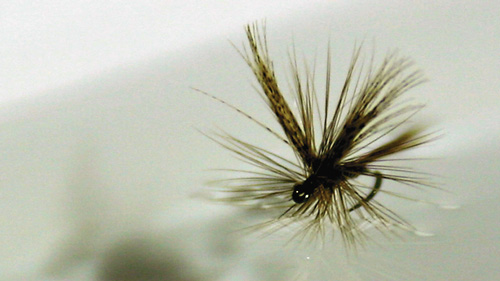
Fishing for trout with flies is like solving a puzzle. The current, the fish, the bugs under the surface and in the air all seem indecipherable. The clues are there however, and the code can sometimes, although by no means always, be broken.
Getting Ready
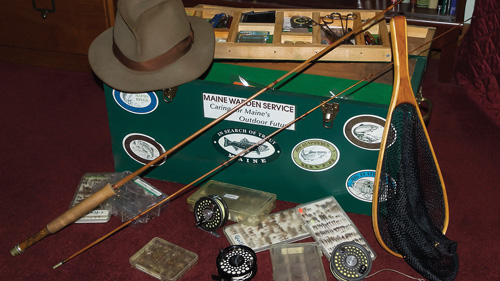
Young or old, rich or poor, anyone who has felt a fish at the end of his or her line understands that the tug is the drug, an expression presently trending among fly fishers. But for me, it is the anticipation of what may come as I cast my fly upon the water, watching it float upon the stream?s surface as naturally as a bit of faerie dust.
God's In Heaven
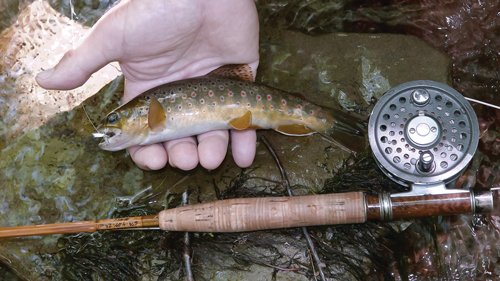
In this time of twenty-four-hour news cycles, divisive politics, never-ending wars, and exotic viruses, I find myself returning to Bonnie Brook during these precious few weeks of spring, when the woodland flowers are in bloom, the earth's young are still filled with wonder, and the trout of Bonnie Brook are once again willing to come out and play. For this remains a time when God is in heaven and for a brief time all's once again right with my world.
Home Waters
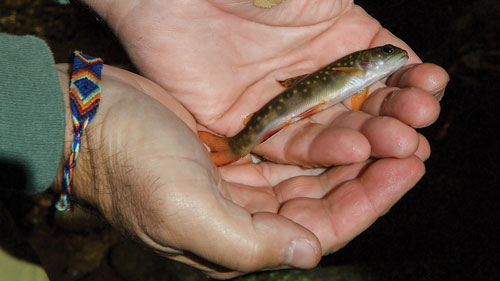
I must step around the delicate bluets that dot the trail beside Bonnie Brook. On either side of the path, dandelions rise from wild tufts of grass. Sprinkled through the unkempt carpet of green and yellow are blue-and-white violets that add to the festive feeling of the afternoon.
If Not Now, When?
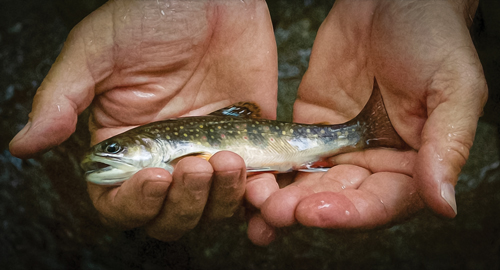
It's been a tough year's virus we can't seem to control, economic hardship, social unrest across the country, the warmest summer on record, and a citizenry as divided as it has ever been. These are the thoughts running through my mind while driving toward Bonnie Brook on this fall morning. Alongside the road, tawny strains of summer grasses wave in the breeze that sweeps across the fields. A barn leans to one side. In need of painting, the roof sags like the back of an old mare.
Like A Finch's Feather
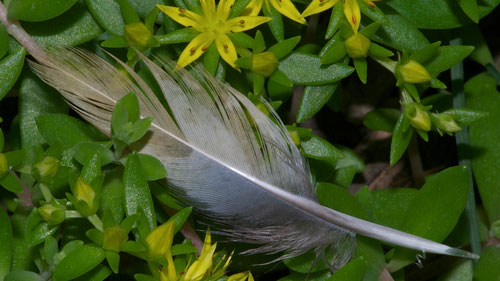
There are many books devoted to writing. These books cannot teach how to fill the blank page. They do not try. Unlike the harsh admonition attributed to James Joyce—"Write it, damn you write it! What the hell else are you good for?"—these books place a calm hand upon the shoulder, whispering in the ear, "Go ahead sweetie, it’ll be fine, put down that first word and then the next."
Looking Back
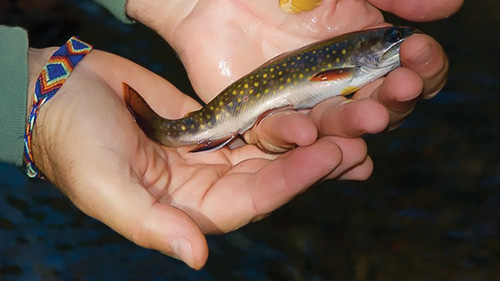
On this morning during the third week in November, many of the fields in our rural part of the state contain rows of corn stubble or the ragged remains of hay that has been harvested by this time of year. But it's the fish of Bonnie Brook that I recall the most.
Nightsong and the Raven

You might think that a photographer and nature enthusiast would logically construct something like a glossy, coffee table style volume full of striking pictures, graced with technical notes about the wolf's life-cycle and it's precarious position in the modern world. But Dan has taken, as usual, another road.
November Song

Some days unfold slowly, but listen carefully to catch their rhythm, and you may enjoy the tune. This morning, I wake to the sound of honking, as a squadron of geese reconnoiters the lake north of our house. Outside the bedroom window, the leaves of a maple burn red against an ashen sky. Across the yard, a mixed flock of robins and waxwings pick through the powdery-blue berries of two red cedars that flank the gravel drive, which flows through our property like a long set of rapids, opening into a wide pool.
November Song

Some days unfold slowly, but listen carefully to catch their rhythm, and you may enjoy the tune. This morning, I wake to the sound of honking, as a squadron of geese reconnoiters the lake north of our house. Outside the bedroom window, the leaves of a maple burn red against an ashen sky. Across the yard, a mixed flock of robins and waxwings pick through the powdery-blue berries of two red cedars that flank the gravel drive, which flows through our property like a long set of rapids, opening into a wide pool.
October Trout
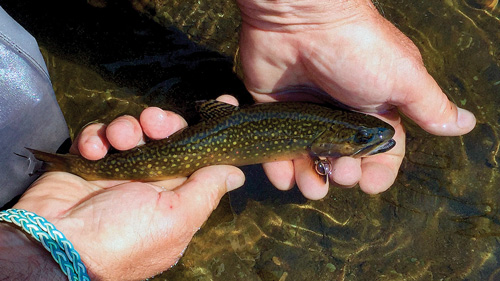
While July may be a month for tall glasses of lemonade and August a time for corn on the cob with melted butter dripping down the sides, September is a month of transition. Summer may be over, but fall has yet to truly begin. Although humidity still clings to the leaves and gnats continue to plague the gardener, schools are once again open. In most states, the end of the month brings with it the official close of the fishing season.
Opening Day
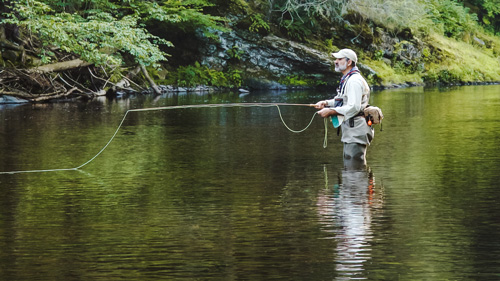
Most years, I'd remain at home during opening day; for me fishing has never been a team sport. But it has been an especially long winter, and so instead, I pass by the diner and drive out of town.
Promise of the Season
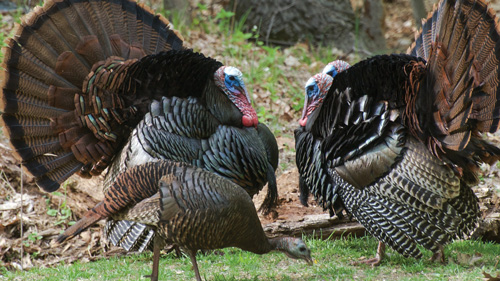
For weeks we have heard the gobbles and clucks of turkeys coming from the deep woods, a small flock of hens and another of immature jakes venturing into the yard to peck at the seed under our bird feeders, but lately, toms have appeared strutting onto the pond's earthen dam, the ducks unimpressed with their elaborate display.
Secrets To Share

I haven't seen fish in the little stream since the weekend after Father's Day. They are there, these wild trout, retreating to their secret places, much too skittish to take a fly in the thin water that remains as spring gives way to summer.
Spring Diary
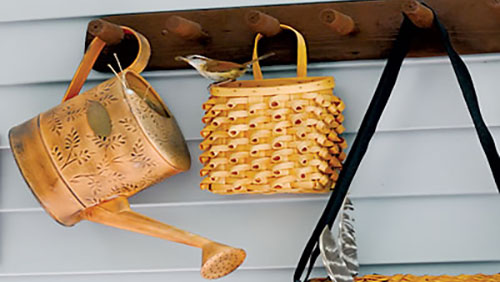
The sun rises a bit earlier, sets later. The birds notice, their early-morning chatter deafening as they congregate in the tippy tops of the trees.
Spring Fishing

I’m seated on a trunk of a pin oak that fell across the width of the stream. The run above it rushes along the edge of the far bank, a portion of which has collapsed around the exposed roots of the tree. For this small brook, the run is considered a long one.
Summer Reflections
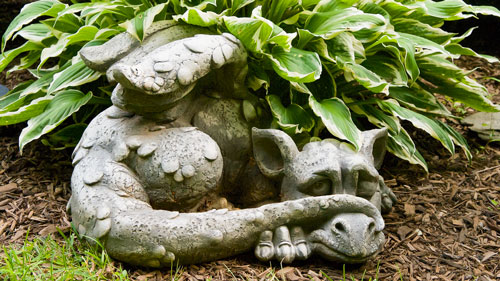
The temperature has reached into the nineties, and it’s not yet noon. My fly rods remain in their tubes, my flies in their sleeves. It is much too hot to play tag with the fish of Bonnie Brook, too hot to do much of anything. Even the koi we stocked more than eighteen years ago, seek relief from the heat. I watch them face the current of the little stream that feeds the pond separating our lawn and gardens from a woodlot frequented by turkey, deer, and black bear.
Summer Surprise
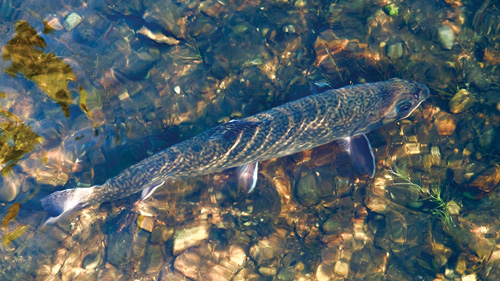
I saw a flash of white as the maw of a very big trout opened and then closed around the helpless fly. I could feel the power of that fish when I pulled back on the bamboo rod. And then there was nothing. When I reeled in my line, I found that my fly was gone.
Thanks for Thirty
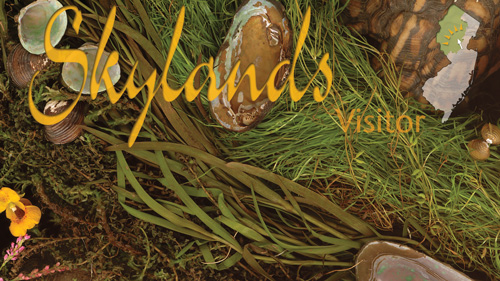
It has been thirty years since the Skylands Visitor magazine was conceived in partnership with the Skylands Tourism Council to promote tourism in Northwest New Jersey. The tourism council is long dissolved, but our publication has survived primarily to the overwhelming support that has come from a wide range of brilliant writers and photographers. We'll start by remembering these three writers, mostly because they're gone and are sorely missed. There are many more, and we'll go along this year, and maybe next, trying to adequately acknowledge their gifts.
The Little Black

Sometime before dawn on the second day of November the little black came into the world.
There And Back Again
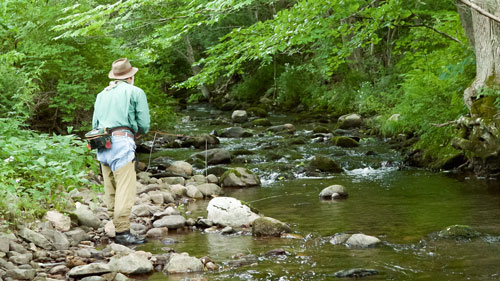
There is another type of fishing, one that can be employed on smaller streams such as Bonnie Brook. Along these secret rills, I can cast to trout without coming upon another angler. In these narrow ribbons of water, hidden under shadows cast by hardwood and conifer, I've come to appreciate what Thoreau described as "... these jewels... these bright fluviatile flowers, made beautiful, the Lord only knows why, to swim there!"
This Magic Moment
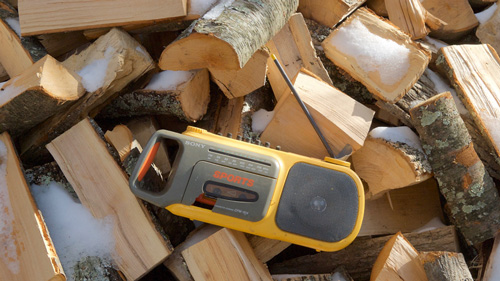
A flock of juncos rises from the feeders around our house. They sweep over the tops of the trees as a beam of sunlight breaks through the clouds, and in that moment, all of the illness, isolation, and strife of the last year fall away. Tears fill my eyes.
Vernal Equinox

In a hemlock forest surrounding a little stream, snow remains packed, although receding, the stream's current running high and cold, coltsfoot spreading over an exposed shoal, a touch of yellow to brighten the otherwise bland landscape.
Zookeepers Daughter

The Zookeeper’s Daughter is the journal of Lori Space Day, the third generation at Space Farms Zoo and Museum in Sussex, N.J

